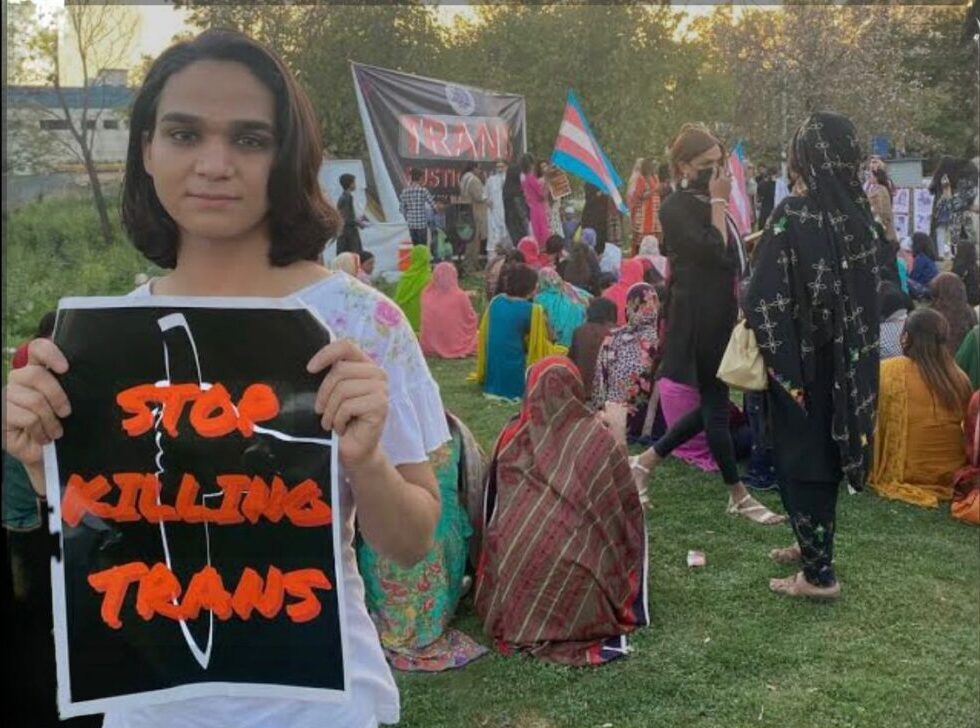Staff Report
PESHAWAR: The fan turns lazily above Farzana Jan’s head, scattering the heavy Peshawar air but doing little to ease the weight she carries. A chipped teacup sits untouched beside her on the floor. Draped in a plain cotton shawl, she leans forward, her voice calm but edged with exhaustion. “The transgenders community in KP under extreme pressure,” she says. “We face harassment, kidnapping, and social exclusion every day. And no one is willing to protect us.’
Farzana is not just another member of the transgender community. As president of the Trans Action Committee, she has spent years speaking for those Pakistan prefers not to see. But here, in Khyber Pakhtunkhwa, a region as conservative as it is rugged, even a voice as steady as hers struggles to be heard.
This year alone, 14 transgender persons have been murdered in the province. Farzana recites the number as if it were a funeral roll call. “Most of the killers easily secure bail,” she says, her tone flat. ” And no one is ever punished.”
Police may take down reports, but what follows, Farzana explains, is silence or worse. In two recent cases, transgender victims of violence went to the police, only to be threatened themselves and pressured to withdraw their statements. “Justice?” she says bitterly. “Even when we seek it, we are told to disappear.”
Also Read: Honour Killings In Pakistan Claim 392 Women In 2024: HRCP Report
But death does not only come at the hands of killers. For the transgender community in KP, the slower death comes from stigma, especially when it meets disease.
Babli, 28, remembers her own unraveling. She had been ill for months, losing weight rapidly, when a local quack failed to diagnose her condition. A doctor finally suggested an HIV test. The result was positive. “When I saw that paper, I felt like my life was over,” she says. Her voice drops before she adds: “It’s not just the virus that kills you. It’s how people look at you after.”
Her story is echoed in a recent study by Blue Veins, a civil society group working on gender rights in KP. The report, “Understanding the Impact of HIV Stigma on Transgender Persons Living with HIV in Khyber Pakhtunkhwa,” paints a grim picture: family rejection, public discrimination, and relentless social exclusion have driven many into severe mental health crises. Rates of depression, anxiety, and suicidal thoughts are markedly higher among transgender people living with HIV than among the general population.
In many cases, the cruelty is internalized. A 2024 study by Dale et al. found that the absence of family support, combined with constant fear of violence, creates a toxic cycle of shame, low self-worth, and withdrawal from society. For many transgender women in Pakistan, the diagnosis of HIV is not just a medical condition it is a psychological collapse.
The tragedy, activists argue, is that even Pakistan’s healthcare system is not built to save them. “There are hardly any HIV treatment centers that are transgender-inclusive,” says Qamar Naseem Program Manager at Blue Veins. “And where treatment is available, stigma itself keeps transgender people from accessing it.”
Medical staff often lack training in transgender-sensitive care, leaving patients humiliated or mistreated. For many, the experience is so alienating that they choose silence over treatment.
“If someone tests positive, even their own peers refuse to live with them,” says Mahi Gul, another community member. “They’re afraid afraid that sitting near you or touching your things will infect them. That fear keeps people away from testing. From treatment. From living.”
The World Health Organization raised the alarm as far back as 2010, warning that HIV and mental health care for transgender persons in South Asia was “almost non-existent.” Fifteen years later, in KP, little has changed. With no structured mental health support, many transgender people fall into self-medication, substance abuse, and risky coping mechanisms often making their conditions worse.
for the transgender population in KP, even survival is criminalized. Farzana describes what happens when the community encounters the state: “Police extort money, beat us, threaten us, and then demand bribes to let us go. If you try to fight back, you disappear. Or worse.”
The Blue Veins report confirms her words, documenting how persistent police harassment drives transgender persons out of familiar neighborhoods, forcing them into new, unsafe spaces. The displacement strips away networks of support and leaves them vulnerable to exploitation, sexual violence, and untreated illness.
Many are pushed into street-based sex work, a livelihood born of necessity but criminalized under law. Their profession is stigmatized, their lives objectified, and their bodies deemed expendable. Even NGO-run safe houses, meant to provide relief, are not spared often targeted by vigilantes or pressured by authorities.
Farzana does not temper her words. “We are citizens of this country,” she insists. “We pay rent. We vote. We bleed. Yet the law does not see us. The police do not protect us. And society does not want us.”
In 2018, Pakistan passed the Transgender Persons (Protection of Rights) Act, a landmark piece of legislation that promised recognition and safety. But seven years later, activists say its impact remains almost invisible. Stigma around HIV, in particular, has made any real progress nearly impossible.
“The law may exist on paper,” Farzana says, “but it has not changed the police, the hospitals, or the courts.”
What she and others demand is straightforward: legal protection, medical access, social respect, and equal rights. Until then, transgender lives in Khyber Pakhtunkhwa remain precarious lived in shadows, shaped by fear, and too often ended in violence.

